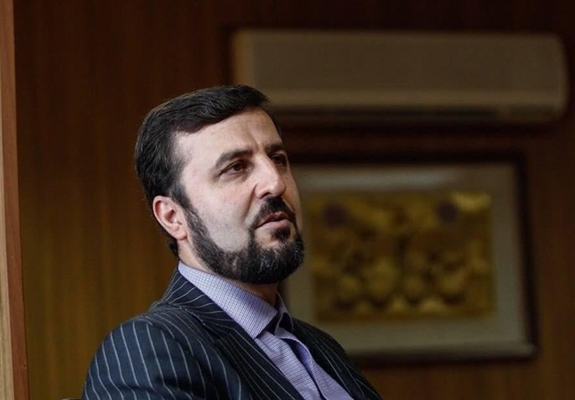Kazem Gharibabadi said the new report by the IAEA about the Iran nuclear agreement, officially known as the Joint Comprehensive Plan of Action (JCPOA), illustrates Iran’s activities with regards to the implementation of its decision to suspend its commitments under the JCOPA.
He said the report highlights the following points:
– Iran’s production of heavy water crossing the 130-tonne mark and reaching 132.6 tonnes
– Using new machines for uranium enrichment, including IR4, IR 5, IR6, IRS, IRS6 and IR2 machines, on research and development lines
– Enriching uranium up to 4.5 percent and more than the level specified in the JCPOA
– Production of 1571.6kg of enriched uranium, which is 550.7kg more than the amount stated in the March report, and 1356.5kg of that is uranium enriched by 4.5 percent.
Iran’s envoy added the following points are also mentioned in the report with regards to the agency’s work to verify and monitor Iran’s obligations under the JCPOA:
– Continuation of verification and supervision work amid the coronavirus pandemic, and Iran’s proper cooperation in that regard
– The continuation of Iran’s voluntary and temporary implementation of the Additional Protocol and the continued verification of the protocol’s declarations by the agency
– The IAEA’s continued work to verify non-diversion of nuclear materials declared by Iran.
– And that the agency has been verifying and monitoring Iran’s nuclear commitments since the JCPOA went into force.
Based on the report, despite the US unilateral withdrawal from the JCPOA, which ran counter to international regulations, Iran tried to preserve the JCPOA on the condition that other signatories to the deal made good on their commitments under the deal. However, after nearly two years, the Europeans failed to live up to their obligations. As a result, Iran began scaling down its commitments under the deal in a bid to be able to reap the benefits of the JCPOA.
Accordingly, Iran began reducing its commitments on January 5, 2020 whereby Tehran would have no restrictions in the operational domain (including the enrichment capacity, the percentage of enrichment, the amount of enriched material, and research and development), and from then on, Iran’s nuclear program would go on only based on its technical needs. Meanwhile, Iran’s cooperation with the IAEA will continue.
In reaction to Iran’s move and disregarding their own procrastination with regards to full implementation of their commitments, the European Troika (France, Germany and Britain) tried to urge Iran to return to the full implementation of its obligations by using a mechanism to settle differences.
On January 18, 2020, they issued a statement expressing their willingness to activate this mechanism. Still, European Foreign Policy Chief Josep Borrell announced that the mechanism was no operation yet, and that the European parties are in agreement that the timetable for its implementation be extended.
